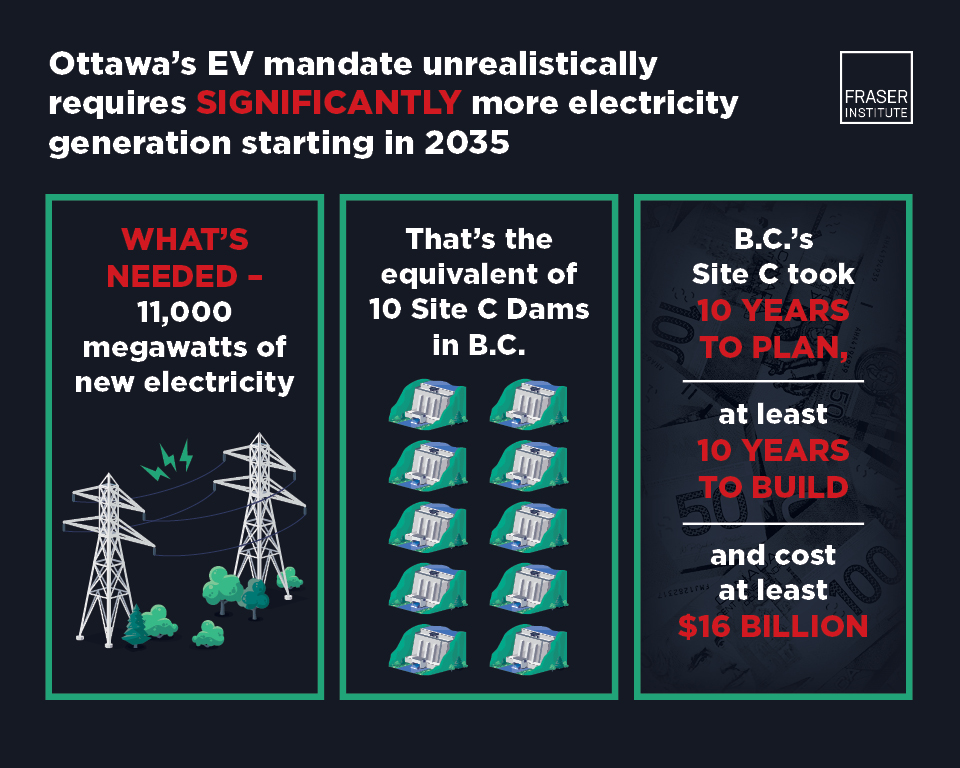Study
| EST. READ TIME 2 MIN.Ottawa’s EV mandate unrealistically requires the equivalent of 10 new mega hydro dams or 13 large natural gas plants nationwide within 11 years
Electric Vehicles and the Demand for Electricity
- Governments are implementing measures to electrify transportation. In Canada, federal policy mandates that by 2035 all new passenger vehicles and light trucks sold have net zero emissions, ultimately leading to a fully electric fleet.
- Electric vehicles (EVs) remain a relatively small share of the vehicle market, growing from less than 1% of sales in 2017 to 9.1% in Q4 2022.
- This study examines the impact of increasing EV adoption on Canada’s electricity grids, estimating the additional generating capacity needed to meet the rising demand from EVs.
- EVs could put a strain on Canadian electricity grids with annual increases in electricity demand ranging from 46.8 terawatt hours (7.5% of total generation) to 95.1 terawatt hours (15.3%).
- This would require the construction of ten new mega dams, comparable to BC’s Site C, on Canadian rivers or thirteen new average-sized gas plants. Based on recent experience with British Columbia’s Site C dam, which has a capacity of 1,100 MW and is expected to generate sufficient power for 450,000 homes, it took more than a decade to plan and comply with environmental regulations and approximately another decade to construct. Meanwhile, there is growing opposition to the construction of additional gas pipelines and gas plants because of their environmental impacts.
- Meeting the expected electricity demand from EVs adoption in Canada is not feasible given the current mandate timelines and the time required to develop and construct electricity generation and infrastructure.

Share
-

Cornelis "Kees" van Kooten
Professor of Economics, University of VictoriaG. Cornelis van Kooten, a Fraser Institute senior fellow, held the Canada Research Chair in Environmental Studies and Climate at theUniversity of Victoria for 21 years. His research interest focuses on natural resource economics and management, and issues related to the economics of climate change.At the University of Victoria, Professor van Kooten was responsible for one of the world’s few softwood lumber trade models, and led interdisciplinary studies on economic factors related to land use, carbon offsets, water use, energy, agriculture, forestry and wildlife. He has published 12 books and more than 230 academic articles.Professor van Kooten is the recipient of numerous academic and professional awards, including being named a Fellow of the Canadian Agricultural Economics Society and a Fellow of the Royal Society of Canada.He received a B.Sc. in Geophysics from the University of Alberta, an M.A. in Economics from the University of Alberta, and a Ph.D. in Agricultural & Resource Economics from Oregon State University.… Read more Read Less…
Related Topics
Related Articles
Canada should heed Germany’s destructive climate policies
By: Kenneth P. Green
UN climate conference—it’s all about money
By: Kenneth P. Green
Global fossil fuel use rising despite UN proclamations
By: Julio Mejía and Elmira Aliakbari
Ottawa’s proposed emission cap lacks any solid scientific or economic rationale
By: Jock Finlayson and Elmira Aliakbari